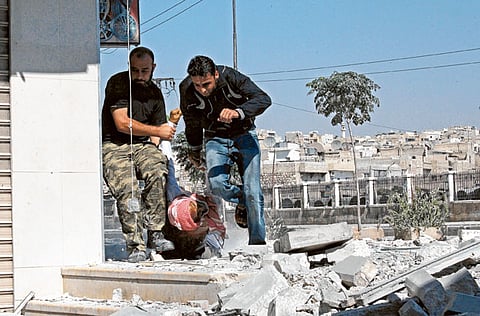Syrian casualties rise exponentially
Non-intervention and more air strikes combine to increase the body count

Beirut: International observers reported that more than 30,000 people, mostly civilians, were killed in Syria since the outbreak of the revolution against the rule of President Bashar Al Assad in March 2011. These were conservative estimates with an astounding figure of at least 305-mowed down last Wednesday alone, even if that merely recorded the names of the dead that could be properly “documented.”
Unidentified bodies under crushed buildings, or exposed in streets across many cities, mean that casualty figures were higher. Observers detected at least three reasons behind the sharp escalation. It was obvious that increased aerial bombings caused indiscriminate deaths, maiming and terrorizing remaining residents in Aleppo, Hama, Idlib, Deir Al Zor and other cities and villages.
Amnesty International estimated that hundreds were killed or injured, including many children, under “unguided bombs dropped from the air and imprecise artillery shells and mortars which have a wide impact radius and cannot be aimed at specific targets.”
Military analysts believed that “such indiscriminate attacks [violated] fundamental provisions of international humanitarian law, as they [failed] to distinguish between military targets and civilian objects.” Eyewitnesses confirmed that Syria was littered with unexploded ordnance and remnants of weapons, including “air-delivered Soviet-era bombs and other unidentified bombs packed with pieces of metal rods for maximum impact.
” To avoid such attacks, residents fled towns and villages, seeking refugee in neighbouring countries or to camp out in the surrounding countryside. Some hid in caves, although upcoming weather changes was likely to expose them to the elements, with serious humanitarian concerns because of poor sanitary conditions. An equally important reason for the spike in casualty rates may be related to the refusal of Western countries to sell revolutionary forces much needed anti-aircraft missiles.
Opposition leaders routinely accused the west of complicity in the killings and seldom refrained from pointing the finger for ignoring calamities galore.
Ahmad Al Fajj, a brigadier-general in the regular Syrian army before his defection a few months ago, concluded that “the free peoples of the world — Europeans, Americans — must understand that their governments are indirectly responsible for the killings in our country.”
Fajj, 64, spoke with an AFP correspondent a few days ago and insisted: “We asked all the arms dealers and traffickers in the region to sell us anti-aircraft missiles. They told us they needed the green light from the CIA and Mossad, and the light was red.”
“They won’t sell us anti-tank weapons for the same reason,” he affirmed, lamenting the scarcities.
“All we have to defeat Bashar’s tanks are the RPGs we manage to retrieve from the enemy,” he confirmed. Inasmuch as RPGs may be useless against military aircraft and helicopter gunships, General Fajj had a point.
Hand-held weapons could not possibly perform like anti-aircraft equipment.
Ironically, Western governments feared that such weapons could easily fall into the hands of extremists, though it was difficult to know who these individuals were and how many of the latter operated in Syria.
Although France preferred to provide such wherewithal, its American and British allies hesitated, further highlighting divisions.
Paris further wished to encourage the establishment of safe havens along the Turkish-Syrian border, but on this score as well, it differed with Washington and London.
In the event, it was difficult to imagine how extremists could actually get hold of any anti-aircraft missiles, assuming that these were not shipped without minimal manpower assistance. Notwithstanding lofty commentaries in support of the Syrian people, it was possible to fathom that Western powers wished to gradually bleed the Ba‘ath regime in Damascus, both in men and treasure.
In fact, US Treasury Department officials insisted that Al Assad’s regime was literally running out of money to keep up the fight.
According to unnamed officials, the regime probably spent about half of its cash holdings, and may be running out of local currency.
Still, few knew how long cash reserves might last, or whether Iran would continue to fill Syrian coffers. Nevertheless, the regime was confronted with a genuine dilemma, running out of time and money, which may explain the latest resolve to escalate military assaults.
Under the circumstances, survival of the regime depended on its ability to pay civil servants and the remaining military, as well as keep essentials flowing to people, especially staples like rice and cooking gas. The moment it resorted to rationing would surely provide a clear clue that Damascus faced its existential conundrum.



